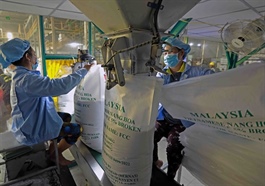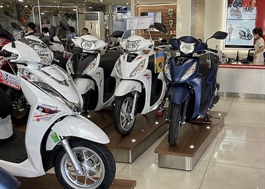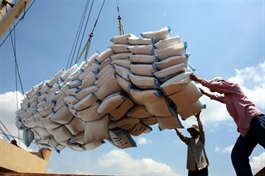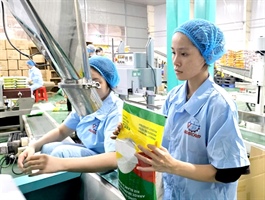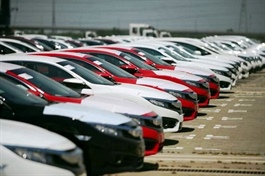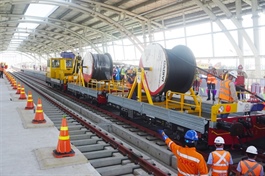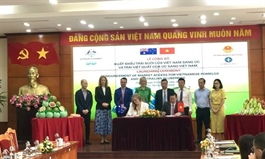Timber sector seeks solutions to VAT refunds
Timber sector seeks solutions to VAT refunds
Billions of VND in delayed VAT refunds are leaving Vietnam's timber enterprises short of capital for reinvestment, stalling production, and directly threatening the livelihoods of millions of people across the country.
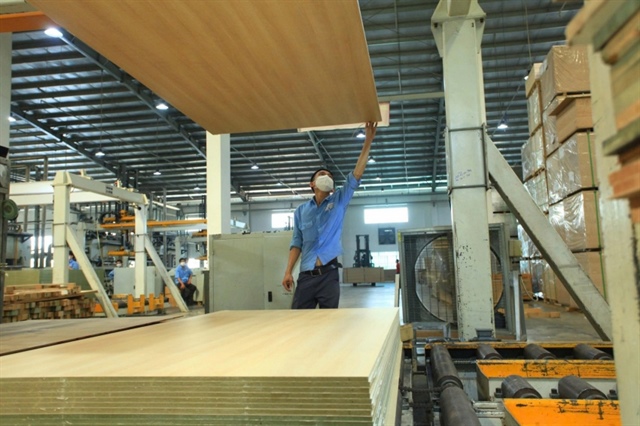
Vietnam's timber industry is targeting $16.9 billion in export value in 2025. Photo: Le Toan |
The Vietnam Timber and Forest Products Association (VIFOREST) has petitioned the Ministry of Finance and relevant agencies to eliminate VAT on primary wood products and recognise them as agricultural outputs exempt from VAT. It has also called for consistent application of Decree 209/2013/ND-CP, which clearly stipulates that ordinarily processed plantation timber should not be subject to VAT.
According to the association, this proposal would allow processing and exporting firms to avoid burdensome deductions and refund procedures, reducing compliance costs and freeing up working capital. “Our goal is to ease administrative bottlenecks, mitigate legal risks, and prevent losses to the state budget from invoice fraud,” VIFOREST stated in its report. The move, it argued, would also protect the incomes of millions of rural household engaged in afforestation.
The sector's achievements underscore what is at stake. Vietnam today maintains more than 4.6 million hectares of planted forests, producing an annual harvest of 35-40 million cubic meters of timber, sufficient to meet 75–80 per cent of processing demand. Export turnover of wood and wooden products is forecast to reach $16.9 billion in 2025, ranking sixth among Vietnam's export categories. The industry provides direct jobs for over 500,000 workers and sustains millions of smallholder tree growers.
These numbers point to an acute liquidity challenge. Preliminary figures from VIFOREST indicate that timber enterprises are still waiting for VAT refunds worth around VND6.1 trillion ($250 million). The delay is linked to current procedures that require refunds to be processed only after thorough review.
On paper, the system is meant to secure the state budget. In practice, it has stalled refund approvals for compliant businesses. “Many companies have complete and legitimate dossiers, yet they are still asked to provide additional clarifications over and over again,” noted Cao Xuan Thanh, chief of office at VIFOREST. He stressed that refund processing often exceeded the statutory deadline, causing serious cash flow disruption.
Thanh pointed out that the requirement to trace raw material origins back to individual households is especially unrealistic. “A single export shipment may be sourced from dozens of growers across multiple provinces,” he explained. “The verification process becomes unworkable, and that is where enterprises get stuck.”
The consequences are immediate. Exporters are forced to advance 10 per cent VAT on input materials while awaiting refunds, eroding their capacity to rotate capital. This hits small- and medium-sized firms the hardest. With industry-wide profit margins averaging only 5-7 per cent, the sector loses an estimated VND500-600 billion ($20-25 million) annually due to refund delays, equivalent to 2-3 per cent of total profit.
Delayed refunds also damage Vietnam's standing abroad. Foreign clients experience late deliveries and deferred payments, eroding confidence. More dangerously, exporters risk sanctions under the EU's regulation on deforestation-free products (EUDR). “If traceability obligations are not properly met, the EU could issue yellow or red cards, which would severely hurt our market access,” VIFOREST warned.
Nguyen Liem, vice chairman of VIFOREST, added that product classification is another barrier. He observed that plantation timber after harvest, such aslogs, sawn timber, peeled veneer, or woodchips, has not been clearly recognised as “primary processed” goods. “Because of this ambiguity, exporters accumulate large VAT credits that cannot be refunded in time,” he said.
Liem further noted that both enterprises and small traders are still obliged to declare and pay VAT even on minimally processed timber, increasing costs and paperwork. In his words, “These procedures consume enormous time and resources, but the refunds remain out of reach. This has paralysed business cash flows and put many companies at risk.”
The risks extend beyond liquidity. Several exporters waiting on refund larges have been accused of enjoying state subsidies in trade defence investigations overseas. Domestically, extended refund disputes can push legitimate businesses into legal jeopardy. Meanwhile, the “request-and-grant” nature of the current system leaves room for arbitrary delays and even corruption.
These obstacles are driving a troubling shift: some companies now prefer to import timber rather than purchase from domestic plantations, simply to avoid VAT refund complications. This undermines demand for local wood, stripping millions of farmers of stable buyers and disincentivising reforestation. Thanh cautioned that the government might ultimately face the paradox of bailing out commercial plantation forests, a scenario entirely at odds with Vietnam's sustainable forestry goals.
VIFOREST's message is clear: resolving VAT refund issues is not merely about tax administration. It is about preserving national reputation, protecting farmers' livelihoods, and securing the industry's competitiveness in a global market increasingly focused on sustainability. “If these obstructions are not lifted, we risk losing both domestic and international trust,” Thanh emphasized.
In its petition, the association stresses that timely VAT reform will immediately free up liquidity, reduce exposure to legal risks, and enhance compliance with international traceability standards. More broadly, it would help solidify Vietnam's position as a reliable, responsible supplier of timber products. “Unlocking these refunds is not a privilege, it is a necessity,” Liem underlined. “Without it, the industry cannot play its intended role as a pillar of the green, circular economy.”
- 18:58 14/10/2025



